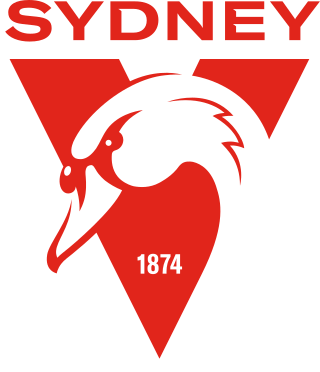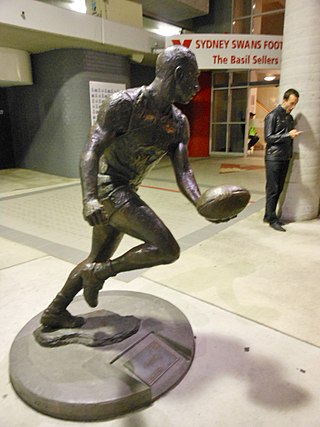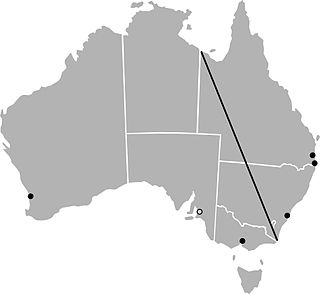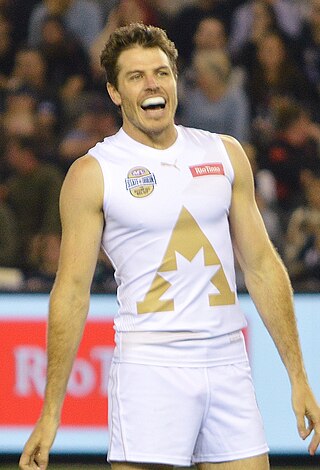Related Research Articles

The Sydney Swans are a professional Australian rules football club based in Sydney, New South Wales. The men's team competes in the Australian Football League (AFL), and the women's team in the AFL Women's (AFLW). The Swans also field a reserves men's team in the Victorian Football League (VFL). The Sydney Swans Academy, consisting of the club's best junior development signings, contests Division 2 of the men's and women's underage national championships and the Talent League.

Paul Kelly is a former Australian rules footballer, winner of the Brownlow Medal and captain of the Sydney Swans for ten seasons. He was and still is known to Swans fans everywhere as "Captain Courageous".

The Riverina Football Netball League (RFNL) is an Australian rules football and netball competition containing nine clubs based in the Riverina region of New South Wales, Australia. The league features three grades in the Australian rules football competition, with these being First-Grade, Reserve-Grade and Under 17s. In the netball competition, there are five grades, with these being A-Grade, A Reserve-Grade, B-Grade, C-Grade and Under 17s. Governed by AFL Riverina, the league is the only major country league in New South Wales, and was formerly a VFL recruiting zone for South Melbourne from 1968 to 1986.

In the Australian Capital Territory (ACT), Australian rules football is a popular spectator and participation sport which has been played continuously since 1911. With 9,129 adult and 2,953 children playing the sport, it has the fourth highest team sport participation after soccer, basketball and netball. The current governing body is AFL Canberra founded 1922 which runs the competition by the same name, while the development body is AFL NSW/ACT established in 1999.

In New South Wales, Australian rules football dates back to the 1860s colonial era, with organised competitions being continuous since the 1880s. It is traditionally popular in the outback areas of the state near the Victorian and South Australian borders— in the Murray Region, in the Riverina and in Broken Hill. These areas form part of an Australian cultural divide described as the Barassi Line. To the west of the line it is commonly known as "football" or "Australian Football" and to east of the line, it is promoted under the acronym "AFL" by the main development body AFL NSW/ACT. There are more than 15 regional leagues though some are run from other states, the highest profile are AFL Sydney and the Riverina Football Netball League. With 80,572 registered players, it has the third most of any jurisdiction.
Dennis Carroll is a former Australian rules footballer who played with the Sydney Swans in the Victorian Football League (VFL). He was the last South Melbourne player to retire for Sydney.

The Barassi Line is an imaginary line in Australia which approximately divides areas where Australian rules football or rugby league is the most popular football code. The term was first used by historian Ian Turner in his 1978 Ron Barassi Memorial Lecture. Crowd figures, media coverage, and participation rates are heavily skewed in favour of the dominant code on either side. Most other sports are unaffected by the dichotomy; Australian cricket, for example, has maintained consistent national interest throughout its history, though soccer faces more competition for participation in areas where Australian rules is more popular.
Anthony Joseph Daniher is a former Australian rules footballer who played with the South Melbourne/Sydney and Essendon Football Clubs in the Australian Football League (AFL). Anthony's brothers, Terry, Neale and Chris, also played for Essendon in the AFL. Anthony is currently the owner of Danihers Facility Management, a facility management business with offices in Melbourne, Brisbane and Sydney. He is the father of Joe Daniher.
The AFL National Championships is an annual Australian national underage representative Australian rules football tournament. Since taking over as national governing body in 1995, the AFL has gradually restructured the competition into a primary junior pathway for its fully professional national club competition.

Henry Dedrich "Harry" Lampe was an Australian rules footballer who played with the South Melbourne Football Club in the Victorian Football League (VFL). Originally from Wagga Wagga, he was considered one of the best Australian rules footballers from New South Wales.

The Robertson Oval is a multi-use sports facility in Wagga Wagga, New South Wales, Australia. It primarily hosts cricket, Australian rules football and rugby league matches. A grass embankment runs around three-quarters of the oval with a 350-seat grandstand and social club on western side of the ground. Plans are in place for a 3–5 million dollar redevelopment of the arena. As the oval is located in the heart of Wagga Wagga CBD, the AFL and New South Wales Cricket Association will use the oval after redevelopment preferring it to other regional venues.

Isaac Smith is a former Australian rules football player who previously played for the Hawthorn Football Club and Geelong Football Club in the Australian Football League. Smith was drafted by the Hawthorn with the 19th pick in the 2010 AFL draft and played ten seasons for the Hawks. He took part in each of Hawthorn's three consecutive Grand Final victories from 2013 to 2015. Following the 2020 season, Smith moved to the Geelong Football Club as a free agent and played with the Cats for three seasons. He won his fourth premiership with Geelong in 2022 and was awarded the Norm Smith Medal as the game's best player. Smith retired from AFL at the conclusion of the 2023 AFL season, his third year at Geelong.

The Allies is a composite team competing in interstate representative Australian rules football matches that comprises players from Australian Capital Territory, New South Wales, Northern Territory, Queensland and Tasmania.
Orren Stephenson is an Australian rules footballer who played for the Geelong Football Club and the Richmond Football Club in the Australian Football League (AFL).
Nathon Irvin is a former Australian rules footballer who played with the Sydney Swans in the Australian Football League (AFL).
Greg Miller is a former Australian rules football player and administrator. He played with South Melbourne in the Victorian Football League (VFL).
Colin Anderson is a former Australian rules footballer who played for the Melbourne Football Club in the Victorian Football League (VFL). Originally from the Mulwala Football Club which competed in the Murray Football League, Anderson was listed with Melbourne from 1969 to 1972. He made his VFL debut in the round 10 match against North Melbourne at Arden Street Oval where he was named as a ruck rover and was retained in the side the next week in the match against Fitzroy at Junction Oval for his final VFL match, in which he totalled two senior games for his career. He was transferred to the Glenelg Football Club in the South Australian National Football League (SANFL) in 1973 where he went on to play 90 games and kick 93 goals. He was also a professional sprinter where he won the 1975 Bendigo Two Thousand race. Following his career with Glenelg, he became a playing coach at Wagga in the Farrer Football League in 1976 where he led the Wagga Tigers Firsts to 3 consecutive Grand Finals, winning the first two in 1977 and 1978. In 1980, there was speculation he would return to the VFL and sign with South Melbourne, however, he was unable to secure a transfer from Glenelg and returned to that SA club to try and help secure a premiership with the SANFL Tigers in 1980, where he played the entire season helping to get Glenelg into the GF. Coach John Halbert dropped him the morning of the GF into the reserves in favour of an untried shorter player, Tony McInnes, debuting into the 1st’s in the GF. The 1st’s lost and the Glenelg Reserves took the flag. A bitter-sweet end to Anderson’s career with the Bays. pla
Peter Curtis is a former Australian rules footballer who played with North Melbourne in the Victorian Football League (VFL).
Victorian bias in the Australian Football League is an assertion by critics of the Australian Football League (AFL) that there is a bias or favouritism towards its Victorian-based clubs.
In the Riverina, Australian rules football is the equal most popular football code and has a long history since the establishment of the Federal Football Club with the earliest recorded interclub match occurring in 1881 against the Albury Football Club. Unusually for New South Wales, Australian rules football is quite popular in the Murray and Southern Riverina especially in the larger cities of Albury and Wagga Wagga. The region is considered to form part of the Barassi Line which divides areas where Australian rules and rugby are popular. There are many clubs and leagues in the district, including the Riverina Football League, Farrer Football League, Hume Football League and Northern Riverina Football League. In addition, many clubs along the border play in Victorian leagues such as the Ovens & Murray Football League, Murray Football League, Picola & District Football League and the Golden Rivers Football League.
References
- ↑ Inside Football "Where Are They Now" 22 April 1998.